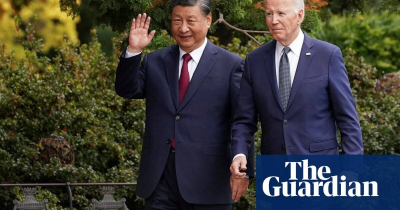The Guardian-Biden and Xi seek to manage tensions in phone call as US officials head to China
April 2, 2024 4 min 669 words
这篇报道揭示了中美两国领导人之间的紧张关系,以及他们如何在争论和不同观点中寻求和解的尝试。特别是在关于台湾和美国对中国高科技产品贸易限制的问题上,双方都在保持立场,但也在寻求管理紧张关系的办法。习近平对美国的高科技出口禁令表示了强烈的反对,而拜登则坚决地拒绝了习的诉求。此外,拜登对中国社交媒体应用TikTok的问题也没有退让。尽管习近平在国内的权力稳固,并在亚洲采取了强硬的态度,但他似乎也渴望缓和与美国的摩擦,因为中国正在经历经济的困难时期。这一切都表明,中美关系的未来充满了不确定性和挑战,但双方似乎都在努力寻找共同的解决办法。
Joe Biden and Xi Jinping have clashed in a telephone call about Taiwan and US trade restrictions on technology, but sought to manage their tensions, as two top US officials prepare to visit Beijing.
The nearly two-hour telephone conversation on Tuesday was the two leaders’ first direct interaction since a summit in November in California that saw a marked thaw in tone, if not the long-term rivalry, between the world’s two largest economies.
The treasury secretary, Janet Yellen, will leave Wednesday and visit both Guangzhou, the southern city emblematic of China’s manufacturing power, and Beijing, with Secretary of State, Antony Blinken, due in China in the coming weeks, officials said.
“We believe that there is no substitute for regular communication at the leader level to effectively manage this complex and often tense bilateral relationship,” national security council spokesman John Kirby told reporters after the call.
US officials said the talks were not aimed at managing but rather than resolving differences, and the two leaders were open about heated disagreements.
Xi accused the United States of creating economic risks through Biden’s sweeping ban on high-tech exports to China.
“If the United States insists on suppressing China’s high-tech development and depriving China of its legitimate right to development, we will not sit idly by,” Xi warned, according to Chinese state media.
Biden rebuffed his appeal, with the White House saying he told him “the United States will continue to take necessary actions to prevent advanced US technologies from being used to undermine our national security, without unduly limiting trade and investment.”
Biden also refused to back down on TikTok, the blockbuster Chinese-owned app that Congress is threatening to ban unless it changes hands, with Kirby saying Biden insisted he wanted to protect Americans’ data security.
Xi, China’s most powerful leader in decades, has solidified power at home and taken a tough approach in Asia, with a crackdown on freedoms in Hong Kong and assertive confrontations in recent weeks with the Philippines on the South China Sea.
But US observers see Xi as eager to temper the friction with the United States as China weathers rough economic headwinds.
At the California summit, he agreed to two key asks by the United States – curbs on precursor chemicals for making fentanyl, the synthetic painkiller behind a US overdose epidemic, and restoring dialogue between the two militaries to manage crises.
Xi may also believe there is more opportunity to work with Biden, who faces a rematch in November’s presidential election with Donald Trump, who has cast China as an arch-enemy.
Biden has preserved or even accelerated some of Trump’s tough measures, but has also identified areas of common interest, such as fighting climate change.
The White House said Biden pressed Xi to ensure “peace and stability” across the Taiwan Strait ahead of the inauguration on 20 May of President-elect Lai Ching-te.
China has denounced Lai, a longtime supporter of a separate identity for the self-ruling democracy claimed by Beijing, but US officials have been cautiously optimistic that China’s military moves ahead of the inauguration will not go beyond past practice.
In the phone call, Xi told Biden that Taiwan remains an “uncrossable red line” for China, according to state media.
The United States has voiced growing alarm over rising Chinese moves against the Philippines in the dispute-rife South China Sea.
The Biden administration, while maintaining dialogue with China, has put a strong focus on supporting allies.
In the midst of the diplomatic flurry with China, the Japanese prime minister, Fumio Kishida, will pay a state visit to Washington next week, with the Philippine president, Ferdinand Marcos, joining for three-way talks.
Blinken and Yellen will both be paying their second visits to China in less than a year, marking a return to more routine interaction following the Covid pandemic and soaring tensions under Trump.

